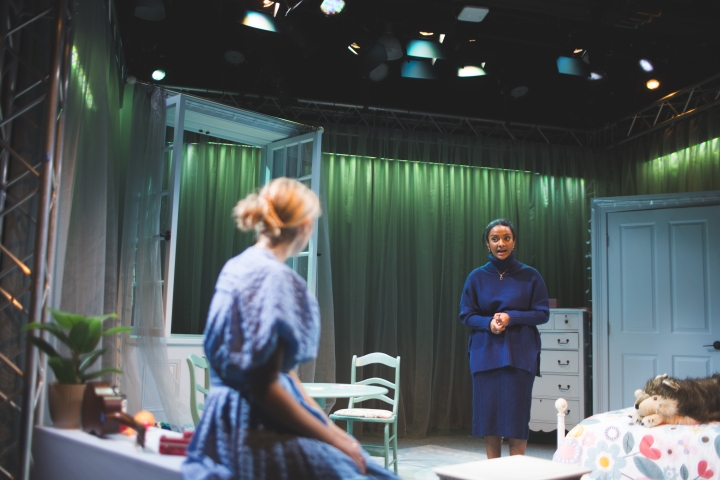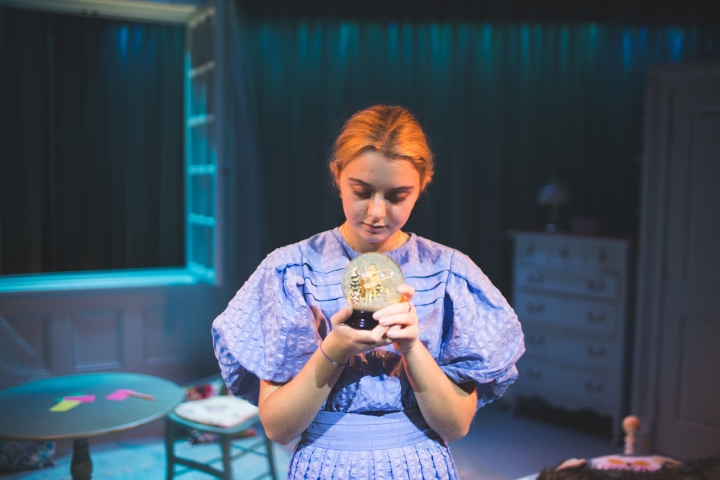An intimate new theater at 4 Currier Place will feature plays, puppetry, and inventive performances in the coming months, including Lost Girl, the Department of Theater’s fall ’23 MainStage production, which opens this weekend.
Theater on Currier is among the ever-growing array of venues on campus and beyond that are showcasing Dartmouth events while the Hopkins Center for the Arts undergoes renovation and expansion.
With a flexible stage layout, lighting to match, and bleacher-style seating for just 65 people, “it’s a legit little black box theater,” says Joshua Price Kol ’93, the Hop’s managing director and executive producer.
Black box theaters are typically small, simple performance spaces—often painted black—that allow for flexible set, seating, and lighting designs.
And that makes it a perfect space for Lost Girl, an “introspective” show by Kimberly Belflower, says Julia Zichy ’27, who plays the lead.
A coming-of-age story chronicling the life of Wendy Darling in the years following her adventures with Peter Pan, the show is set in Wendy’s childhood bedroom.
“It’s a very intimate space, so you can be very vulnerable, and there’s no need to over- exaggerate your movements because the audience can see perfectly,” Zichy says. Theater is about connecting with an audience, “and I get to tell them my story, the story of Wendy, which is, I guess, our little secret for that hour and a half.”
Formerly home to offices—including, at one time, the Magnuson Center for Entrepreneurship, the theater was designed by the Department of Theater and built over the course of several months by the department’s production staff, says Rebecca Biron, department chair. The crew, who wrapped up the work in late June, “did just an astoundingly good job,” she says.
So far, Theater on Currier has been used for a Theater Department open house, readings of student plays, and a New York Theatre Workshop event.

And come winter, it will be the setting for a specially designed Theater Department production.
“The history of cabaret is to take politically relevant topics and do an intimate house show with a variety of types of performance,” Biron says. So, in lieu of a traditional MainStage production, “we’re taking advantage of that to have the students put on a self-defined cabaret.”
Other upcoming shows at the theater include Kristina Wong for Public Office, Jan. 12 to 14, and puppet shows in March by the Putney, Vt.-based Sandglass Theater Company.
The events exemplify “the kind of shows that we’re finding we can do and that are right-sized” for given venues, says Michael Bodel, the Hop’s director of external affairs. “We’re finding productions that work during this period of time and that can be rewarding and impactful.”
Certainly, that seems to be the case with the Department of Theater show, in which the main character grapples with her fear of growing up.
In a way, Lost Girl is “dealing with all the anxieties” that this generation of students has about going out into the world, says director Peter Hackett ’75, the Avalon Foundation Chair of the Humanities.
Hackett has two children ages 19 and 22 and says that he and the cast have talked at length about the “extraordinary courage” required by their generation, which faces such issues as gun violence, climate change, religious and political institutions “that have failed us,” and the aftermath of COVID-19.
This generation, like Wendy, has a challenging lesson to learn, he says. “If you can accept that life is difficult, and you can muster the courage to face it, you will not necessarily have a life without disappointment, because bad things happen to good people, but you will have a happy life.”
Performances are set for Oct. 27 and 28, and Nov. 1 to 4, at 7:30 p.m., with matinees on Oct. 28 and Nov. 4 at 3 p.m.
